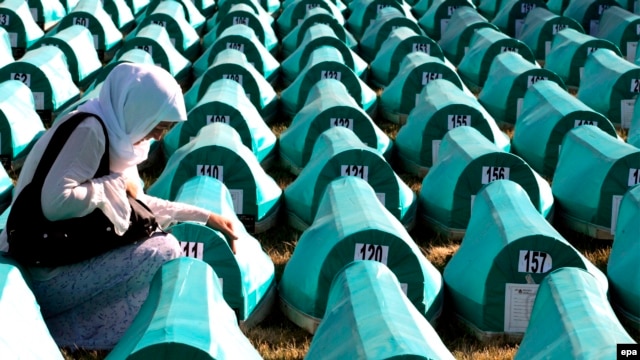Russia opposes UN measure on Srebrenica as 'divisive'
| Publisher | Radio Free Europe/Radio Liberty |
| Publication Date | 1 July 2015 |
| Cite as | Radio Free Europe/Radio Liberty, Russia opposes UN measure on Srebrenica as 'divisive', 1 July 2015, available at: https://www.refworld.org/docid/55b5f43fc.html [accessed 21 May 2023] |
| Disclaimer | This is not a UNHCR publication. UNHCR is not responsible for, nor does it necessarily endorse, its content. Any views expressed are solely those of the author or publisher and do not necessarily reflect those of UNHCR, the United Nations or its Member States. |
July 01, 2015
By RFE/RL
 Bosnian Muslim women mourn over a casket at the Potocari Memorial Center during the burial in 2008 of 308 Bosnian Muslims killed by Bosnian Serb forces in Srebrenica.
Bosnian Muslim women mourn over a casket at the Potocari Memorial Center during the burial in 2008 of 308 Bosnian Muslims killed by Bosnian Serb forces in Srebrenica.
Russia has slammed a draft United Nations resolution on the Srebrenica genocide as divisive and said it would present its own measure to mark 20 years since the massacre.
Britain has circulated a draft text to the Security Council ahead of the 20th anniversary of Srebrenica to reflect on the UN's failure to prevent genocide.
Russian Deputy Ambassador Petr Iliichev told reporters that the British draft was "divisive" and focused too heavily on wrongdoings carried out by the Bosnian Serbs.
"It focuses on only one aspect," said Iliichev. "It was only one part of the conflict."
The council is expected to adopt a resolution on July 7, just days before Bosnia is to hold commemorations at the Srebrenica memorial to remember one of the darkest chapters of the 1992-95 war.
But it remained unclear if the 15 council members would come to agreement after Russia proposed to drop any mention of Srebrenica in the text and focus instead on the Dayton peace accord that ended the war, diplomats said.
About 8,000 Bosnian Muslim men and boys were slaughtered by ethnic Serb forces in July 1995 in what was the UN-protected enclave of Srebrenica.
It was Europe's worst atrocity since World War II and has been labeled a genocide by two international courts.
Bosnian Serb leaders have called on Russia, which was close to Serbia during the war, to veto the resolution, taking issue in particular with the use of the word "genocide" to describe the massacre.
In a letter to UN Secretary-General Ban Ki-moon, the Serb chairman of Bosnia's rotating presidency, Mladen Ivanic, called the resolution "anti-Serb because it fails to mention in any way the Serb victims of the Srebrenica region."
Alexei Zaitsev, the press secretary of Russia's UN mission, said Russia's alternative resolution will "be more balanced and oriented at reconciliation of the sides rather that at drawing new disengagement lines" in the region. He did not elaborate.
British Ambassador Matthew Rycroft said his resolution "will commemorate the victims of the Srebrenica genocide, and those who suffered on all sides in the war."
The British draft resolution will "encourage further steps towards reconciliation" and "affirm our determination to prevent genocide," he said.
Bosnia's 1992-95 war claimed some 100,000 lives and left the country split into two semi-independent entities – the Serbs' Republika Srpska and the Muslim-Croat Federation.
With reporting by AFP and TASS
Link to original story on RFE/RL website
